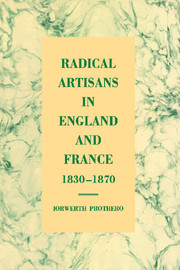Book contents
- Frontmatter
- Contents
- Acknowledgements
- List of abbreviations
- Introduction
- 1 Artisans
- 2 Radicalisms
- 3 Trade unionism
- 4 Work and radicalism
- 5 Socialism
- 6 Co-operation
- 7 Class and radicalism
- 8 Political action and organisation
- 9 Education and civilisation
- 10 Religions and philosophy
- 11 The culture of radical clubs
- Conclusion
- Notes
- Select bibliography
- Index
2 - Radicalisms
Published online by Cambridge University Press: 24 November 2009
- Frontmatter
- Contents
- Acknowledgements
- List of abbreviations
- Introduction
- 1 Artisans
- 2 Radicalisms
- 3 Trade unionism
- 4 Work and radicalism
- 5 Socialism
- 6 Co-operation
- 7 Class and radicalism
- 8 Political action and organisation
- 9 Education and civilisation
- 10 Religions and philosophy
- 11 The culture of radical clubs
- Conclusion
- Notes
- Select bibliography
- Index
Summary
Radical themes
Radicalism is against privilege and for equality. These two fundamental elements are not unambiguous and can be understood in different ways, and radicals differed amongst themselves. Radicalism should therefore be seen not as a uniform philosophy or programme but as a diverse and contradictory array of people, concepts, and strategies leading to loose coalitions with broadly agreed outlooks and aims. One basic element was that power was unequal, and that the few who held it used it unfairly in their own interests at the expense of the many. Such inequality takes many forms, and resentment at them is age-old, but an essential second aspect of the radicalism that is the concern of this study focused on public institutions, in which the rich, privileged few, through corruption and favouritism, monopolised the top positions in the state, the remedy lying in representative democracy, open and accountable government, and certain basic negative freedoms that involved extensive limits on governmental power. Since this was not achieved in our period, except for a brief interlude in France in 1848–9, radicalism was characterised by a sustained critique of the existing unfair, unfree and privilege-ridden system, run by groups of which the landowning class was the most important, and fattening parasitically on a rather loosely defined and heterogeneous ‘people’. The content of this radicalism was already established by 1830, and as new groups came into politics, they naturally adopted established vocabularies and organisational forms.
Privilege
One of the most powerful and constant elements in radicalism right through our period was resentment at and condemnation of ‘corruption’.
- Type
- Chapter
- Information
- Radical Artisans in England and France, 1830–1870 , pp. 22 - 45Publisher: Cambridge University PressPrint publication year: 1997
- 1
- Cited by

